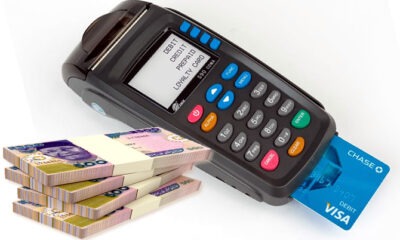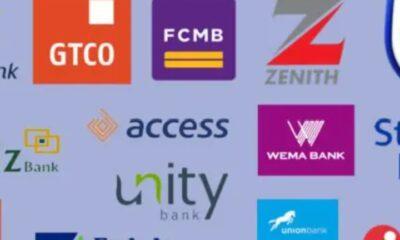Business
Nine Banks’ Non-performing Loans Rise, Hit N814bn – Reports
Published
2 years agoon
By
Editor
The aggregate Non-Performing Loans of nine banks increased to N814.08bn in 2021, representing a 3.16 per cent increase from the N789.14bn reported in 2020, according to findings by The PUNCH.
The nine banks are Access Holdings Plc, Zenith Bank Plc, Wema Bank Plc, FCMB Group, Union Bank of Nigeria Plc and Stanbic IBTC Holdings Plc.
Others are Guaranty Trust Holding Plc, United Bank for Africa Plc, and Ecobank Nigeria.
However, with the banking sector’s NPL ratio closing 2021 at 4.85 per cent, some of the nine banks remained within the five per cent NPL ratio stipulated by the Central Bank of Nigeria.
Further findings also show that while some of the banks recorded an increase in their NPLs during the period under review, a number of them recorded a significant decline in their NPLs.
READ ALSO: $111.5m Fraud: CBN Official Testifies Against Stanley Okafor
From the banks’ audited 2021 financial statements, findings showed that Access Holdings, Zenith Bank and GTCO reported the top three highest NPL by value among the nine banks, while Stanbic IBTC Holdings reported the lowest.
Access Bank in 2021 reported N181.5bn NPL by value, representing an increase of 4.3 per cent from the N161.2bn it recorded in 2020, while Zenith Bank’s NPL hit N146.8bn in 2021 from N125.2bn recorded in 2020, an increase of 17.3 per cent.
Zenith Bank, in a presentation to investors/analysts, explained that it adopted a complete and integrated approach to risk management that was driven from the Board of Directors’ level to the operational activities of the bank.
The bank further explained that its risk management was practiced as a collective responsibility coordinated by the risk control units and is properly segregated from the market-facing units to assure independence.
“There is a regular scan of the environment for threats and opportunities to improve industry knowledge and information that drives decision making. The group maintains a proactive approach to business and ensures an appropriate balance in its risk and reward objectives,” the bank explained.
READ ALSO: Four Banks Record 477,405 Unresolved Complaints In 12 Months –Reports
Wema Bank, in 2021, reported N21.3bn NPL, an increase of 19.3 per cent from N19.3bn in 2020, while FCMB Group’s NPL rose to N45.93bn, representing a 61 per cent increase from N28.57bn it reported in 2020.
Others are Union Bank of Nigeria with N38.66bn NPL in 2021 from N29.45bn reported in 2020, as Stanbic IBTC Holdings reported 23.4 per cent drop in its NPL to N20.3bn in 2021 from N25.5bn in 2020.
Furthermore, GTCO’s NPL value rose by 2.3 per cent to N113.94bn in 2021 from N111.43bn reported in 2020, while UBA closed 2021 with N96.5bn NPL value from N120.08bn reported in 2020, indicating a significant reduction in its NPL.
In addition, ETI Nigeria reported N149.15bn NPL by value in 2021 from N167.41bn in 2020, a decline of 11 per cent.
Ecobank Nigeria reported NPL ratio of 16.6 per cent in 2021 from 19.6 per cent in 2020. Access Holdings closed 2021 with NPL ratio of 4.3 per cent as against four per cent in 2020, as Zenith Bank NPL ratio dropped to 4.2 per cent in 2021 from 4.3 per cent in 2020.
According to analysts, the NPL ratios in the banking sector remained stable in 2021, following the CBN’s forbearance for restructuring loan exposure to critical sectors.
Extract from the banks’ performance revealed that GTCO reported a drop in its NPL to 6.04 per cent in 2021 from 6.39per cent in 2020, while ETI Nigeria reported 16.30 NPL ratio in 2021 from 19.90 per cent in 2020.
GTCO in a presentation to investors/ analysts explained, “The Group improved its asset quality with IFRS 9 Stage 3 loans closing at 6.04 per cent in 2021 from 6.39 per cent in 2020.
READ ALSO: Currency In Circulation Falls By N42.43bn In Two Months
“The marginal increase in prudential NPLs from 6.86 per cent to 6.92 per cent was as a result of stress noted with certain exposures within the hospitality, individuals, clubs, co-operative societies and unions as the obligors within these sectors were severely impacted by Covid-19.
“Downstream sector benefited from the N7.2bn write-off in FY 2021 as its NPLs improved to 8.6 per cent in 2021 from 11 per cent in 2020.
“IFRS 9 Stage 3 loans closed at N113.9bn as of FY 2021 increasing by 2.2 per cent from N111.5bn in 2020. Balance Sheet Impairment Allowance for Stage 3/Lifetime Credit Impaired exposures closed at N57.5bn representing 50.5 per cent coverage of loans in this classification.
“In aggregate terms (including Regulatory Risk Reserves of N87.6billion), the Group has adequate coverage of 150.4per cent for its Stage 3 names/NPLs, this position is consistent with the group’s plan to maintain 100 per cent coverage for its NPLs.”
UBA, Access Bank, and Zenith Bank, among other banks, reported NPL ratio below five per cent in the 2021 financial year.
For instance, UBA’s NPL dropped to 3.60 per cent from 4.70 per cent in 2020.
Speaking on its NPL decline performance, UBA’s Group Chief Financial Official, Ugo Nwaghodoh said, “This testifies to the quality of UBA’s loan portfolio even as the bank remains relentless in its resolve to drive down the Cost-to-Income ratio, which stood at 63.0 per cent at the end of the year.”
Access Bank reported 4.00 per cent NPL ratio in 2021 from 4.30 per cent, while Zenith Bank reported 4.20 per cent NPL ratio in 2021 from 4.30 per cent in 2020.
Stanbic IBTC Holdings reported 2.10 per cent NPL in 2021 from 4.00 per cent reported in 2020.
The Chief Executive, Stanbic IBTC, Dr Demola Sogunle in a statement said the NPLs ratio moderated to 2.1 per cent, well within the acceptable limit of five per cent, as the total NPLs decreased in value by 23 per cent coupled with the responsible loan growth in line with the management conservative credit risk management practices.
In addition, Wema Bank reported NPL ratio declined from 4.9 per cent in 2020 to 4.5 per cent in 2021, as Union Bank of Nigeria’s NPL ratio moved from 4.00 per cent to 4.30per cent in 2021.
FCMB group closed 2021 with 4.10 per cent NPL ratio from 3.3 per cent in 2020.
Members of the Monetary Policy Committee of the CBN, thus, applauded the management’s efforts in ensuring the continued downward trend of NPLs ratio, signifying improving conditions in the banking system
The MPC members also noted the sustained resilience of the banking system, following the progressive improvement in the NPLs ratio from 5.10 per cent in November 2021 to 4.85 per cent in December 2021- a first in a long time.
In her personal statement, a member, CBN Deputy Governor, Aishah Ahmad, said NPLs dropped to its lowest level in over a decade despite the increased lending by banks.
She noted that total credit had increased by N4.09tn between the end of December 2020 and December 2021 with significant growth in credit to manufacturing, general commerce, and oil and gas sectors.
She said, “Key industry aggregates also continued their year-on-year upward trajectory with total assets rising to N59.24tn in December 2021 from N50.99tn in December 2020, while total deposits rose to N38.42tn from N32.21tn over the same period.
READ ALSO: Fraudster Arrested For ATM Card Swap, N640,000 Withdrawal
“Total credit also increased by N4.09tn between end- December 2020 and end-December 2021 with significant growth in credit to manufacturing, general commerce, and oil & gas sectors.
“This impressive increase was achieved amidst continued decline in non-performing loans ratio from 5.10 per cent in November 2021 to 4.94 per cent in December 2021, 6 basis points below the regulatory benchmark for the first time in over a decade.”
PUNCH.
You may like


Leading Ladies: Meet 10 Female CEOs Shaping Nigeria’s Banking Sector [PHOTOS]


Succour As NDIC Pays Over N1.7bn To Customers Of Closed Banks


Bank Customers Pay N154bn Fees For E-banking Services


11 Banks Generated N72.7bn From Account Maintenance Charges In H1 2023


Nigerian Banks Announce Nationwide Strike


Banks, 18 Others, Dined N125m For Late Filings

The Central Bank of Nigeria (CBN) started fresh and direct sales of US dollars at N1,021 per dollar to Bureau De Change operators.
Nigeria’s apex bank disclosed this in a circular signed by its Director of Trade and Exchange Department Hassan Mahmud.
“We write to inform you of the sale of $10,000 by the Central Bank of Nigeria (CBN) to BDCs at the rate of N1,021/$1. The BDCs are in turn to sell to eligible end users at a spread of NOT MORE THAN 1.5 percent above the purchase price,” the circular posted on its website read.
READ ALSO: Tinubu Unveils African Counter-Terrorism Summit
“ALL eligible BDCs are therefore directed to commence payment of the Naira deposit to the underlisted CBN Naira Deposit Account Numbers from today, Monday, April 22, 2024, and submit confirmation of payment, with other necessary documentations, for disbursement of FX at the respective CBN Branches.”
CBN’s move is coming as the naira is recording a slight depreciation against the dollar after weeks of gains.
In late March, the bank also sold $10,000 to each of the eligible Bureau De Change (BDC) operators in the country at the rate of N1,251/$1.
READ ALSO: Mixed Reactions Trail Video Of Couple’s Customised N200 Notes
Like in the most recent sales, it warned BDCs against breaching terms of the dollar sales, vowing to sanction defaulters “including outright suspension from further participation in the sale”.
The fortunes of the naira have fallen sharply since President Bola Tinubu took over in May. Inflation figures have reached new highs and the cost of living hitting the rooftops.
Nigeria’s currency slid to about N1,900/$ some months ago at the parallel market. But in recent weeks, it has gained against the dollar.
The Nigerian authorities have also doubled down on their crackdown against cryptocurrency platform Binance and illegal BDCs.
On March 1, the CBN revoked the licences of 4,173 BDCs over compliance failures.

Olusegun Alebiosu has been appointed as the Acting Managing Director/Chief Executive Officer of First Bank of Nigeria Limited (FirstBank Group), effective April 2024.
Alebiosu steps into this pivotal role from his previous position as the Executive Director, Chief Risk Officer, and Executive Compliance Officer, a position he held since January 2022.
Alebiosu brings to the helm of FirstBank over 28 years of extensive experience in the banking and financial services industry. His expertise spans various domains including credit risk management, financial planning and control, corporate and commercial banking, agriculture financing, oil and gas, transportation, and project financing.
READ ALSO: JUST IN: Access Holdings Names New Acting CEO
Having embarked on his professional journey in 1991 with Oceanic Bank Plc. (now EcoBank Plc.), Alebiosu has held several notable positions in esteemed financial institutions.
Prior to joining FirstBank in 2016, he served as Chief Risk Officer at Coronation Merchant Bank Limited, Chief Credit Risk Officer at the African Development Bank Group, and Group Head of Credit Policy & Deputy Chief Credit Risk Officer at United Bank for Africa Plc.
Alebiosu’s academic credentials further enrich his professional profile. He is an alumnus of the Harvard School of Government and holds a Bachelor’s degree in Industrial Relations and Personnel Management. Additionally, he obtained a Master’s degree in International Law and Diplomacy from the University of Lagos, as well as a Master’s degree in Development Studies from the London School of Economics and Political Science.
READ ALSO: Meet Newly Appointed Union Bank CEO
A distinguished member of various professional bodies, including the Institute of Chartered Accountants (FCA), Nigeria Institute of Management (ANIM), and Chartered Institute of Bankers of Nigeria (CIBN), Alebiosu is renowned for his commitment to excellence and ethical practices in the banking sector.
Beyond his professional endeavors, Alebiosu is known for his passion for golf and adventure. He is happily married and a proud parent.
With Alebiosu’s appointment, FirstBank of Nigeria Limited anticipates continued growth and innovation under his leadership, reinforcing its position as a leading financial institution in Nigeria and beyond.
Business
CBN Gives New Directive On Lending In Real Estate
Published
1 week agoon
April 17, 2024By
Editor
The Central Bank of Nigeria, CBN, has released a new regulatory directive to enhance lending to the real sector of the Nigerian economy.
The directive, issued on April 17, 2024, with reference number BSD/DIR/PUB/LAB/017/005 and signed by the Acting Director of Banking Supervision, Adetona Adedeji, signifies a notable shift in the bank’s policy towards a more contractionary approach.
In line with the new measures, the CBN has reduced the loan-to-deposit ratio by 15 percentage points, down to 50 per cent.
This move aligns with the CBN’s current monetary tightening policies and reflects the increase in the Cash Reserve ratio rate for banks.
READ ALSO: JUST IN: CBN Gov Sacks Eight Directors, 32 Others
The LDR is a metric used to evaluate a bank’s liquidity by comparing its total loans to its total deposits over the same period, expressed as a percentage.
An excessively high ratio may indicate insufficient liquidity to meet unexpected fund requirements.
All Deposit Money Banks are now mandated to adhere to this revised LDR.
The CBN has stated that average daily figures will be utilised to gauge compliance with this directive.
Furthermore, while DMBs are encouraged to maintain robust risk management practices in their lending activities, the CBN has committed to continuous monitoring of adherence and will adjust the LDR as necessary based on market developments.
READ ALSO: JUST IN: CBN Increases Interest Rate To 24.75%
Adedeji has called on all banks to acknowledge these modifications and adjust their operations accordingly. He emphasised that this regulatory adjustment is anticipated to significantly influence the banking sector and the wider Nigerian economy.
The circular read in part, “Following a shift in the Bank’s policy stance towards a more contractionary approach, it is crucial to revise the loan-to-deposit ratio policy to conform with the CBN’s ongoing monetary tightening.
“Consequently, the CBN has decided to decrease the LDR by 15 percentage points to 50 per cent, proportionate to the rise in the CRR rate for banks.
“All DMBs must maintain this level, and it is advised that average daily figures will still be applied for compliance assessment.
“While DMBs are urged to sustain strong risk management practices concerning their lending operations, the CBN will persist in monitoring compliance, reviewing market developments, and making necessary adjustments to the LDR. Please be guided accordingly.”

PHOTOS: FCCPC Raids Supermarkets In Port Harcourt, Seizes Underweight, Re-bagged Rice

Outrage As Kingsmen Flogged Anambra Man To Death [VIDEO]

Man Declared Wanted For Stabbing Wife To Death, Attempted Murder of Two Children
Trending

 Entertainment3 days ago
Entertainment3 days agoBridesmaids’ Dance At Wedding Causes Stir On Social Media [VIDEO/PHOTOS]

 Politics5 days ago
Politics5 days agoEdo Guber: Akoko-Edo PDP Leaders Meet In Igara, Describe Ighodalo, Ogie As ‘Perfect Match’

 Metro3 days ago
Metro3 days agoVIDEO: ‘UNN Lecturer’ Caught Pants Down With Married Student

 News1 day ago
News1 day agoDrama! Supporters Of Yahaya Bello Perform Rituals to Prevent His Arrest By EFCC [Video]

 News2 days ago
News2 days agoVIDEO: Force PRO Orders Arrest Officers Caught On Video Bashing Driver’s Car

 Headline2 days ago
Headline2 days agoDrama As Women Fight Dirty, Breasts Fall Out During Spring Break Outing In US [PHOTOS/VIDEO]

 News4 days ago
News4 days agoOutrage As Chinese Supermarket In Abuja Denies Nigerians Entry

 News3 days ago
News3 days agoIGP, Jonathan Disagree Over State Police

 Entertainment2 days ago
Entertainment2 days agoNollywood Actor, Zulu Adigwe Is Dead

 Metro1 day ago
Metro1 day agoEdo Cultists Kill Rival In Daughter’s Presence, Abandon Getaway Car



































